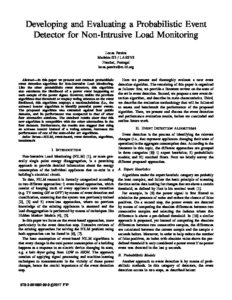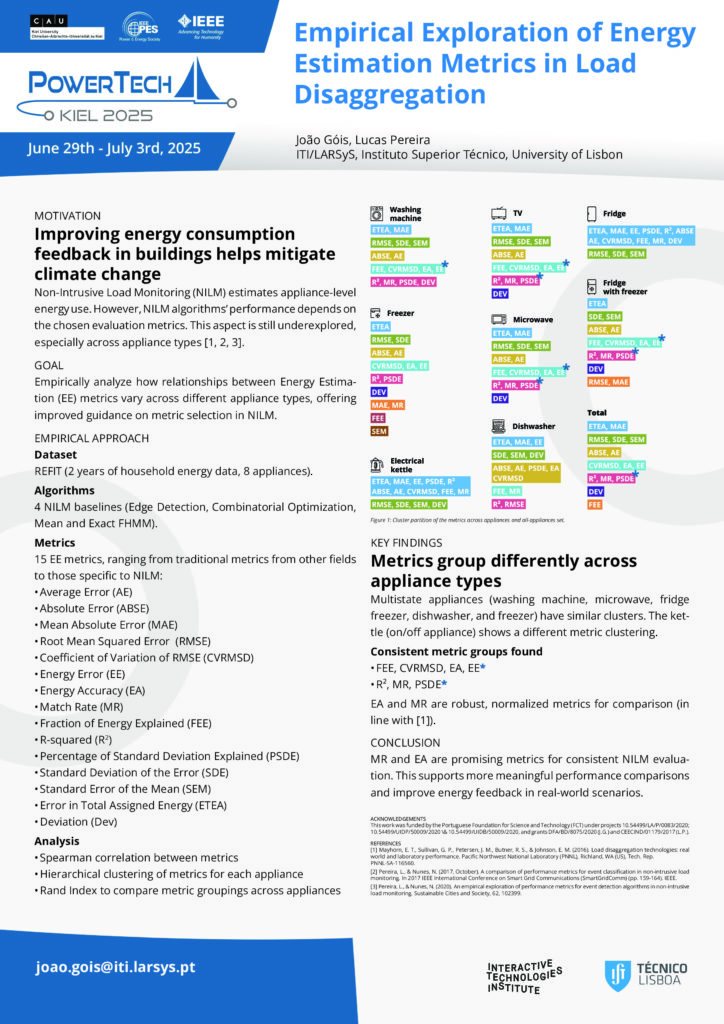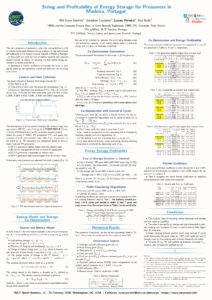Conference
Publication Types:
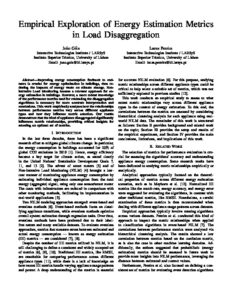
Empirical Exploration of Performance Metrics for Energy Estimation in Load Disaggregation
Abstract
Improving energy consumption feedback to end-users is crucial for energy optimization in buildings, thus reducing the impacts of energy waste on climate change. Non-intrusive Load Monitoring became a relevant approach for energy estimation in buildings. However, a more robust knowledge of the performance metrics used for evaluating the disaggregation algorithms is necessary for more accurate interpretation and conclusions. This work empirically analyses how the relationships between performance metrics vary across different appliance types and how they influence metric selection. Our results demonstrate that the kind of appliance disaggregated significantly influences metric relationships, providing critical insights for selecting an optimal set of metrics.
Poster
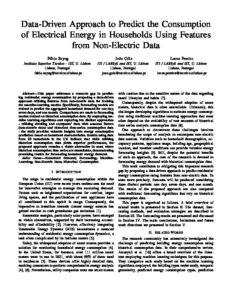
Data-Driven Approach to Predict the Consumption of Electrical Energy in Households Using Features from Non-Electric Data
Abstract
This paper addresses a research gap in predicting residential energy consumption by proposing a data-driven approach utilizing features from non-electric data for training the machine-learning models. Specifically, forecasting models are trained to predict the aggregated household demand for one day, seven days, and one month. Comparisons are made to forecasting models trained on historical consumption data. By employing machine learning algorithms and exploring two distinct approaches – utilizing dwelling and occupants’ data with seasonal factors (non-electric data) and historical time-series consumption data – the study provides valuable insights into energy consumption prediction based on household characteristics. Results using data from 20 households in the UK indicate that while utilizing historical consumption data yields superior performance, the proposed approach remains a viable alternative in cases where historical consumption time series are unavailable, demonstrating promising results for forecasting household energy demand.

Conformal Multilayer Perceptron-Based Probabilistic Net-Load Forecasting for Low-Voltage Distribution Systems with Photovoltaic Generation
Abstract
Probabilistic net-load forecasting in Low-Voltage (LV) distribution networks is essential in light of the increased variability introduced by the widespread integration of renewable energy sources (RES). Various probabilistic approaches based on neural networks have been proposed to solve this challenge. This study introduces lightweight neural network-based conformal prediction (Conformal-MLPF) for net-load forecasting within an LV power distribution network. It uses Split Conformal prediction to transform a lightweight MLP-based point forecast into a probabilistic forecast. Our validation on two real-life LV substations datasets suggests that the proposed Conformal-MLPF achieves a better tradeoff between forecasting performance and model complexity without requiring restrictive assumptions about data distribution.
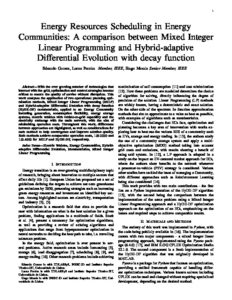
Energy Resources Scheduling in Energy Communities: A Comparison Between Mixed Integer Linear Programming and Hybrid-adaptive Differential Evolution with Decay Function
Abstract
With the ever growing number of technologies that interact with the grid, optimization and control strategies become critical to ensure the quality of service without disruption. This work analyses the application of two operational planning optimization methods, Mixed Integer Linear Programming (MILP) and Hybrid-adaptive Differential Evolution with decay function (HyDE-DF) metaheuristic, applied to an Energy Community including generation, consumption flexibility, energy storage systems, electric vehicles with vehicle-to-grid capability and the electricity exchange with the main network, with the aim of minimizing operation costs. Throughout this work, differences between approaches are highlighted, as well as considerations for each method to help convergence and improve solution quality. Both methods achieve comparable operation costs, 159.3330 and 153.4883 for MILP and HyDE-DF, respectively.

A Computational Implementation for Creating Electric Vehicles Profiles
Abstract
The need to achieve carbon neutrality has boosted the mass adoption of electric vehicles (EVs). However, the electric mobility demand uncertainty can create several technical issues in the power system management and operation. This paper presents a computational implementation based on different probability distributions for creating EVs charging profiles. Initially, aspects related to trips, EVs characteristics, and user profiles are considered as inputs to be used to define the EVs profiles. Then, in the second step, the processing of the inputs aiming to obtain information such as trips during the day, types of EVs, user profiles, trips by users, trip duration, and energy needs are considered. The proposed case studies demonstrate the effectiveness of the computational implementation since the EV profiles created taking into account different numbers of EVs show reliable information related to the EV charging profiles and charging station usage for different days of simulation (weekdays and a weekend).
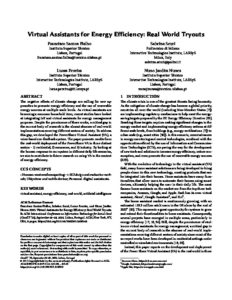
Virtual Assistants for Energy Efficiency: Real World Tryouts
Abstract
The negative effects of climate change are calling for new approaches to promote energy efficiency and the use of renewable energy sources at multiple scale levels. As virtual assistants are becoming a common household item, recent studies have looked at integrating IoT and virtual assistants for energy management purposes. Despite the prominence of these works, a critical gap in the current body of research is the almost absence of real-world implementations covering different sectors of society. To address this gap, we developed the PowerShare Virtual Assistant (VA), a voice-based eco-feedback system. The paper presents results from the real-world deployment of the PowerShare VA in three distinct sectors – 1) residential, 2) commerce, and 3) industry. By looking at the human response to our system in different daily life scenarios, we aim to contribute to future research on using VA in the context of energy efficiency.
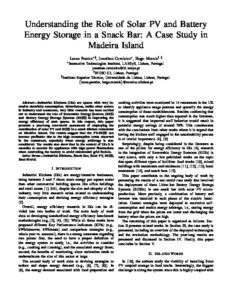
Understanding the Role of Solar PV and Battery Energy Storage in a Snack Bar: A Case Study in Madeira Island
Abstract
Industrial Kitchens (IKs) are spaces with very intensive electricity consumption. Nevertheless, unlike other sectors in industry and commerce, very little research has been carried out to understand the role of Renewable Energy Sources (RES) and Battery Energy Storage Systems (BESS) in improving the energy efficiency of such spaces. In this respect, this paper presents a year-long real-world assessment of employing the combination of solar PV and BESS in a small kitchen restaurant on Madeira Island. The results suggest that the PV-BESS can become profitable due to the high consumption levels observed in the restaurant, especially when energy arbitrage is also considered. The results also show that in the context of IKs it is essential to account for appliances with high power fluctuations when controlling the battery to avoid unintended grid feed-in.
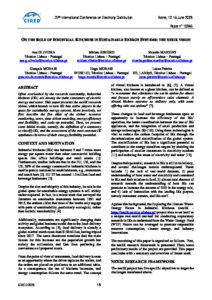
On The Role Of Industrial Kitchens In Sustainable Energy Systems: The nexIK Vision
Abstract
Often overlooked by the research community, industrial kitchens (IKs) are among the main consumers of electric energy and water. This paper presents the nexIK research vision, which intends to turn IKs into active players in the quest for sustainable energy systems. More precisely, we first describe the five pilars of the vision: resource monitoring, users, data-driven modeling, energy efficiency and flexibility, and scale-up potential. Then, we present some initial results, namely, the definition of a taxonomy to classify IKs, and the assessment of the most common IK appliances in terms of their energy flexibility potential.
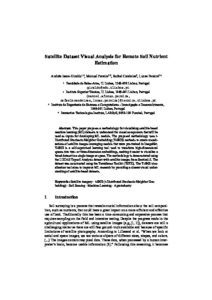
Satellite Dataset Visual Analysis for Remote Soil Nutrient Estimation
Abstract
This paper proposes a methodology for visualizing satellite-based machine learning (ML) datasets to understand the visual components that will be used as inputs for developing ML models. The proposed methodology uses t-Distributed Stochastic Neighbor Embedding (T-SNE) methods to create visualizations of satellite images leveraging models that were pre-trained in ImageNet. T-SNE is a self-supervised learning tool used to transform high-dimensional spaces into two- or three-dimension embeddings, making it easier to visualize a broad dataset in a single image or space. The methodology is demonstrated using the LUCAS Copernicus dataset with satellite images from Sentinel-2. The dataset was constructed using the TerraSense Toolkit (TSTK) and information from the LUCAS Survey, an effort of the European Soil Data Centre. The T-SNE visualization tool aims to improve ML research by providing a clearer understanding of satellite-based datasets.
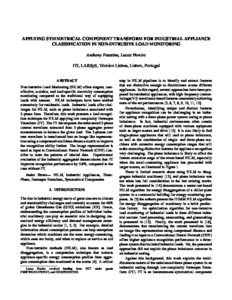
Applying Symmetrical Component Transform for Industrial Appliance Classification in Non-Intrusive Load Monitoring
Abstract
Non-intrusive Load Monitoring (NILM) offers elegant, cost-effective, scalable, and load-specific electricity consumption monitoring compared to the traditional way of equipping loads with sensors. NILM techniques have been studied extensively for residential loads. Industrial loads offer challenges for NILM, such as phase imbalance associated with 3-phase lines. Therefore, this work presents a load recognition technique for NILM applying low complexity Fortesque Transform (FT). The FT decomposes the unbalanced 3-phase current waveform extracted from 3-phase aggregate power measurements to balance the given load. The 3-phases current waveform is transformed into an image-like representation using a compressed-euclidean distance matrix to improve the recognition ability further. The image representation is used as input to Convolutional Neural Network (CNN) classifier to learn the patterns of labeled data. Experimental evaluation of the industrial aggregated dataset shows that FT improves recognition performance by 5.8\%, compared to the case without FT.
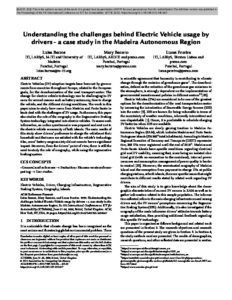
Understanding the challenges behind Electric Vehicle usage by drivers - a case study in the Madeira Autonomous Region
Abstract
Electric Vehicles (EV) adoption targets have been set by governments from countries throughout Europe, related to the European goals, for the decarbonization of the road transport sector. The change for electric vehicle technology can be challenging to EV users for several reasons such as battery autonomy, time to charge the vehicle, and the different driving conditions. The work in this paper aims to study how users from Madeira and Porto Santo islands deal with the challenges of EV usage. Furthermore, this paper also studies the role of the orography in the Regenerative Braking System technology integrated into electric vehicles. To assess such information, an online questionnaire was prepared and sent out to the electric vehicle community of both islands.
The main results of this study show drivers’ preference to charge the vehicles at their household and that users are satisfied with the vehicle’s technology. Also, users’ battery range anxiety did not seem to have a significant impact. Moreover, from the drivers’ point of view, there is still the need to study the role of orography, while using the regenerative braking system.
Resources
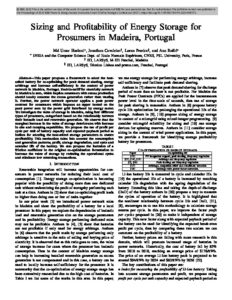
Sizing and Profitability of Energy Storage for Prosumers in Madeira, Portugal
Abstract
This paper proposes a framework to select the best-suited battery for co-optimizing for peak demand shaving, energy arbitrage and increase self-sufficiency in the context of power network in Madeira, Portugal. Feed-in-tariff for electricity network in Madeira is zero, which implies consumers with excess production should locally consume the excess generation rather than wasting it. Further, the power network {operator} applies a peak power contract for consumers which imposes an upper bound on the peak power seen by the power grid interfaced by energy meter. We investigate the value of storage in Madeira, using four different types of prosumers, categorized based on the relationship between their inelastic load and renewable generation. We observe that the marginal increase in the value of storage deteriorates with increase in size and ramping capabilities. We propose the use of profit per cycle per unit of battery capacity and expected payback period as indices for selecting the best-suited storage parameters to ensure profitability. This mechanism takes into account the consumption and generation patterns, profit, storage degradation, and cycle and calendar life of the battery. We also propose the inclusion of a friction coefficient in the original co-optimization formulation to increase the value of storage by reducing the operational cycles and eliminate low returning transactions.
Poster
Resources
Co-optimizing Energy Storage for Prosumers Using Convex Relaxations
Abstract
This paper presents a new co-optimization formulation for energy storage for performing energy arbitrage and power factor correction (PFC) in the time scale of minutes to hours, along with peak demand shaving in the time scale of a month. While the optimization problem is non-convex, we present an efficient penalty based convex relaxation to solve it. Furthermore, we provide a mechanism to increase the storage operational life by tuning the cycles of operation using a friction coefficient. To demonstrate the effectiveness of energy storage performing multiple tasks simultaneously, we present a case study with real data for a time scale of several months. We are able to show that energy storage can realistically correct power factor without significant change in either arbitrage gains or peak demand charges. We demonstrate a real-time Model Predictive Control (MPC) based implementation of the proposed formulation with AutoRegressive forecasting of net-load and electricity price. Numerical results indicate that arbitrage gains and peak demand shaving are more sensitive to parameter uncertainty for faster ramping battery compared to slower ramping batteries. However, PFC gains are insensitive to forecast inaccuracies.
Future Industrial Kitchen: Challenges and Opportunities
Abstract
Large amounts of electricity, water, and food are used every day in Industrial Kitchens (IK). Still, very little attention has been devoted by the research community to this potential source of resource over-consumption. This abstract paper builds on the deployment of sensing technology in three IKs to present the main challenges and potential research directions towards more sustainable IKs.
Presentation Slides
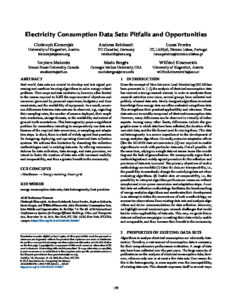
Electricity Consumption Data Sets: Pitfalls and Opportunities
Abstract
Real-world data sets are crucial to develop and test signal processing and machine learning algorithms to solve energy-related problems.
Their scope and data resolution is, however, often limited to the means required to fulfill the experimenters’ objectives and moreover governed by personal experience, budgetary and time constraints, and the availability of equipment.
As a result, numerous differences between data sets can be observed, e.g., regarding their sampling rates, the number of sensors deployed, their amplitude resolutions, storage formats, or the availability and extent of ground-truth annotations.
This heterogeneity poses a significant problem for researchers intending to comparatively use data sets because of the required data conversion, re-sampling, and adaptation steps.
In short, there is a lack of widely agreed best practices for designing, deploying, and operating electrical data collection systems.
We address this limitation by dissecting the collection methodologies used in existing data sets.
By offering recommendations for data collection, data storage, and data provision, we intend to foster the creation of data sets with increased usability and comparability, and thus a greater benefit to the community.
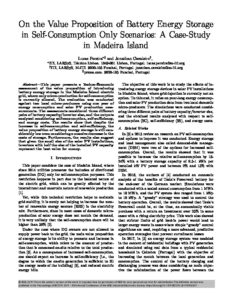
On the Value Proposition of Battery Energy Storage in Self-Consumption Only Scenarios: A Case-Study in Madeira Island
Abstract
This paper presents a Techno-Economic assessment of the value proposition of introducing battery energy storage in the Madeira Island electric grid, where only micro-production for self-consumption is currently allowed. The evaluation was conducted against two local micro-producers using one year of energy consumption and solar PV production measurements. The assessments considered three different pairs of battery capacity/inverter size, and the outputs analyzed considering self-consumption, self-sufficiency, and energy costs. The results show that despite the increase in self-consumption and self-sufficiency, the value proposition of battery energy storage is still considerably low even considering a massive decrease in the costs of storage. Furthermore, the results also suggest that given the small size of the solar PV installations, inverters with half the size of the installed PV capacity represent the best value for money.
Poster
The Acceptance of Energy Monitoring Technologies – The Case of Local Prosumers
Abstract
With transformations happening in the electricity sector, we need to ensure consumers have access to updated and correct information to accompany such changes. Consumers need to understand technologies available to them but also, learn how to use them to optimize their personal investment in such types of equipment. In this paper, we explore how a group of local prosumers has adopted energy monitoring technologies, their day-to-day strategies, and expectations when handling such systems. We studied 11 prosumers and the technologies they have used for three years, evaluated their satisfaction with the feedback provided and analyzed how a more modern visualization of their energy practices was introduced and adopted into their daily lives. We conducted interviews and questionnaires to evaluate their engagement with these tools. This initial work suggests this particular group of users have already a high level of knowledge about their systems, and as a result, have integrated these into their routines. However, more support would be needed from other local actors to help them reach more benefits and as such, more satisfaction as consumers. We conclude by reflecting on barriers that need to be addressed to increase user satisfaction with these systems.
Energy Storage in Madeira, Portugal: Co-optimizing for Arbitrage, Self-Sufficiency, Peak Shaving and Energy Backup
Data Storage and Maintenance Challenges: The Case of Advanced Metering Infrastructure Systems
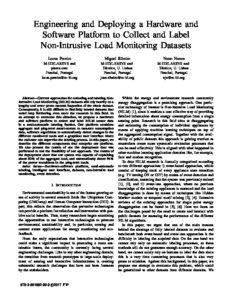
Engineering and Deploying a Hardware and Software Platform to Collect and Label Non-Intrusive Load Monitoring Datasets
Abstract
Current approaches for collecting and labeling Non- Intrusive Load Monitoring (NILM) datasets still rely heavily on a lengthy and error-prone manual inspection of the whole dataset. Consequently, it is still difficult to find fully labeled datasets that could help furthering, even more, the research in this field. In an attempt to overcome this situation, we propose a hardware and software platform to collect and label NILM sensor data in a semi-automatic labeling fashion. Our platform combines aggregate and plug-level smart-meters to measure consumption data, software algorithms to automatically detect changes in the different monitored loads and a graphical user interface where the end-user can supervise the labeling process. In this paper, we describe the different components that comprise our platform. We also present the results of one live deployment that was performed to test the feasibility of our approach. The results of the deployment show that our system was capable of explaining about 82% of the aggregate load, and automatically detect 94% of the power transitions in the plug-level loads.
Resources
Software (GitLab Repository)
Data (SustDataED Public Dataset)
